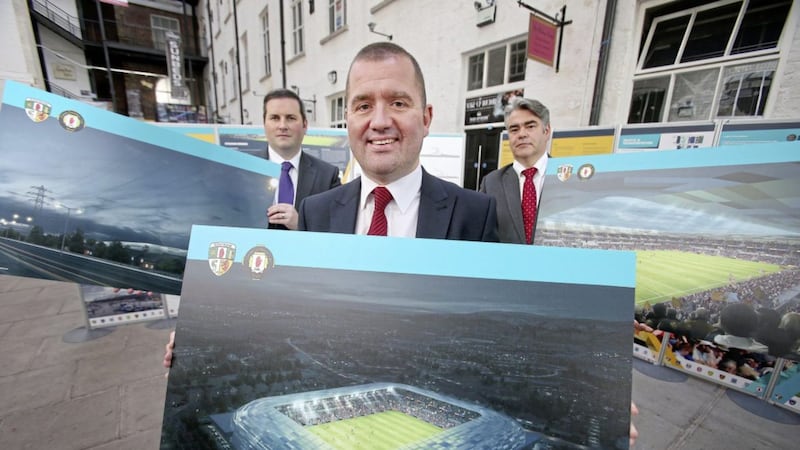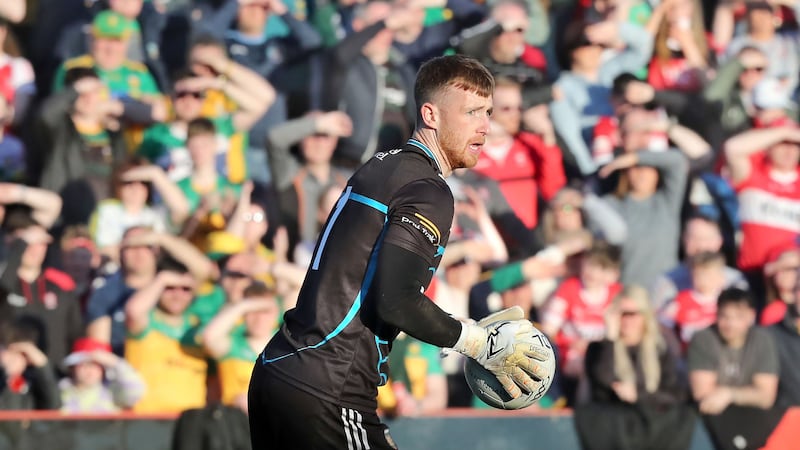CASEMENT Park project manager Stephen McGeehan has insisted that the economic benefits of rebuilding the stadium outweigh the financial concerns over it.
Fresh concern grew yesterday when the GAA’s finance director Ger Mulryan indicated that the money to fund their £15m commitment to the stadium “would not be available in the short-to-medium term”.
Speaking in his annual report, Mulryan said the same would apply to six large-scale infrastructure projects currently in the pipeline, including a proposed new 14,000-capacity stadium for Louth.
Meath, Roscommon, Kildare and Waterford will all have to bide their time as well over various planned investments after the GAA recorded the worst financial year in its history.
The row over the £110m cost of the stadium had already been brewing, with Communities Minister Deirdre Hargey forced during yesterday’s assembly question time to deny a “stand-off” over funding.
The executive had pledged £62.5m but with costs now almost £35m more than the original estimate and expected to rise further, DUP ministers have pushed back against the idea of the public purse making up the shortfall.
£12m has already been spent on the project since 2013, with £1m of that contributed by the GAA.
Ballinderry native McGeehan says the GAA’s position on that remains unchanged and believes that the argument in favour of proceeding with the project is sound.
“The Department of Finance and Conor Murphy have said that as part of the economy’s recovery plan, they’re looking to bring forward major infrastructural projects, whether it’s the A5, A6, Casement Park or many others, that bringing those forward will help the overall economic recovery.
“There’s a balance between financial pressures and trying to keep the economy moving and Casement Park is in a position where, economically, it makes sense for a project of that size to go forward.
“Do the current circumstances make things difficult in terms of finding the finance? Of course it does.
“But the Department of Communities have worked with us for the past five or six years.
“The funding is a challenge for both the department and the GAA, but we’re going to have to find a solution to it.
“The project is still as required, if not more than it was originally. One of the things for government will be a value-for-money judgement.
“That’s what the business case process is about. It’s making sure Ulster GAA can justify the project on that scale from the public purse, and that it will achieve the benefits that are still as valuable today as they were ten years ago.
“Where that question will be answered is through the approval of the business case. We’re still confident that will be approved, albeit we don’t know what the final split is going to be,” he said.
The regional stadium project has delivered the National Stadium and Kingspan Stadium to the IFA and Ulster Rugby respectively.
Casement Park’s original planning application was quashed after a successful legal challenge by residents, while the second application was lodged four years ago at the end of this month.
Part of the recent debate has involved calls for an increase of funding for the sub-regional stadia programme, which had allocated £36m for local soccer in 2015.
That has been subject to the same delays and while the executive have said that money is still available, there is still no timeframe for its delivery.
“Back in 2013, when the funding profiles were agreed, the GAA offered £15m towards achieving strategic stadium requirements,” said McGeehan.
“The IFA offered around £4m and got a £30m stadium. Ulster Rugby had their stadium built at 100 per cent of public funding because they’d already built one stand.
“One of the things that’s hard to accept from the public commentary is that on one hand it would be unfair if the GAA received additional funding, and then arguing that others in the sub-regional project should receive extra funding. That’s double-speak.”
It is also four months since SDLP minister Nichola Mallon recommended approval for Casement Park, but planning permission has yet to be finalised.
Residents are likely to object to the project again but McGeehan says he feels the second application has “dealt with all the issues raised by the community” and that it would be “very regretful if we ended up in another judicial review process, however that’s out of our control entirely.”








